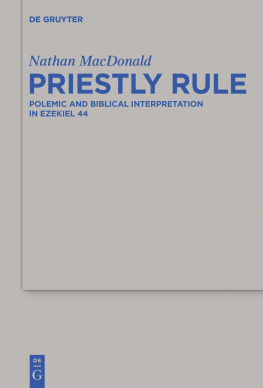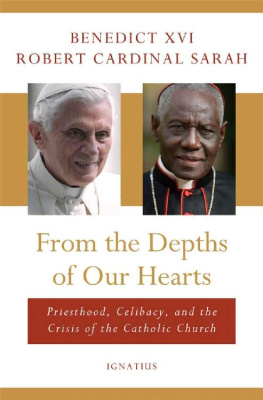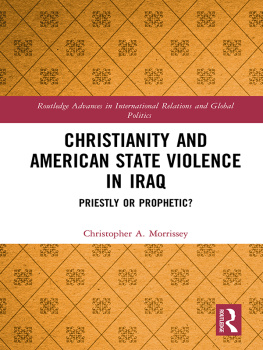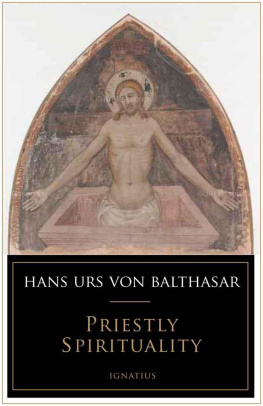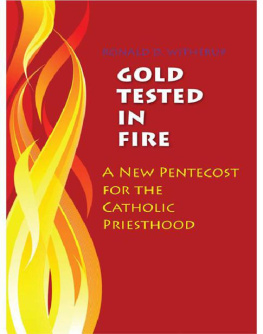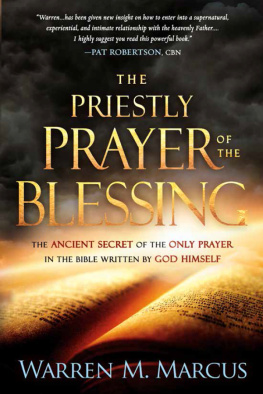
The Institute for Priestly Formation
Mission Statement

The Institute for Priestly Formation was founded to assist bishops in the spiritual formation of diocesan seminarians and priests in the Roman Catholic Church. The Institute responds to the need to foster spiritual formation as the integrating and governing principle of all aspects of priestly formation. Inspired by the biblical-evangelical spirituality of Ignatius Loyola, this spiritual formation has as its goal the cultivation of a deep interior communion with Christ; from such communion the priest shares in Christ's own pastoral charity. In carrying out its mission, the Institute directly serves diocesan seminarians and priests as well as those who are responsible for diocesan priestly formation.
THE INSTITUTE FOR PRIESTLY FORMATION
Creighton Universtiy
2500 California Plaza
Omaha, Nebraska 68178
www.creighton.edu/ipf
Reclaiming Our Priestly Character
Revised Edition
Father David L. Toups
THE INSTITUTE FOR PRIESTLY FORMATION
IPF PUBLICATIONS
2500 California Plaza
Omaha, Nebraska 68178
Copyright 2008, 2010 by
David L. Toups and The Institute for Priestly Formation, Inc.
All Rights Reserved. No part of this book may be reproduced, stored in a retrieval system, or transmitted by any means, electronic, mechanical, photocopying, recording, or otherwise, without the written permission of the Institute for Priestly Formation.
Printed in the United States of America
ISBN-13: 978-0-9843792-1-7
ISBN-10: 0-9843792-1-5
Scripture texts (unless otherwise indicated) are taken from the New American Bible with Revised New Testament 1986, 1970 Confraternity of Christian Doctrine, Washington, D.C. and are used by permission of the copyright owner. All Rights Reserved. No part of the New American Bible may be reproduced in any form without permission in writing from the copyright owner.
Cover design by Timothy D. Boatright
Marketing Associates, U.S.A.
Tampa, Florida
Dedication
To my Dad, who taught me how to be a father.
Leon H. Toups
September 28, 1938 - September 5, 2006
CCC | The Catechism of the Catholic Church |
CIC | The Code of Canon Law |
DMLP | The Directory on the Ministry and Life of Priests |
IPF | The Institute for Priestly Formation |
LG | Lumen Gentium |
NPNF | Nicene and Post-Nicene Fathers |
ORE | L'Osservatore Romano (English Edition) |
OT | Optatum Totius |
PDV | Pastores Dabo Vobis |
PO | Presbyterorum Ordinis |
PPF | The Program of Priestly Formation |
PPLP | The Priest, Pastor and Leader of the Parish Community |
SC | Sacrosanctum concilium |
ST | Summa Theologiae |
UT | Ultimis Temporibus |
Table of Contents
Reclaiming Character:
The Solid Foundation of the Doctrine of Priestly Character
Post-Conciliar Confusion:
Departing from the Tradition

B eing a child of God and serving Him is a joy to those who faithfully and lovingly live their vocation. This is true for all Christians, but for the priest, the ramifications of not doing so are catastrophic. As Blessed Columba Marmion wrote, "There could be no more fatal error for the priest than to underestimate the sacerdotal dignity. He must, on the contrary, have a very high conception of it."
In a day and age in which permanent commitments are devalued by our society and in a particular way, the priesthood is under attack for the sins of a small percentage, it is of utmost importance to re-emphasize both the permanence and the dignity of the calling to the ministerial priesthood. Even beyond these issues, the presbyterate seems divided along generational lines. The intention of Reclaiming our Priestly Character is to serve as a source of renewal for the priesthood. Studies show that priests who have a solid understanding of the sacramental character received at ordination are more likely to be content and faithful in their vocation than those who do not. Pope John Paul II noted, "Knowledge of the nature and mission of the ministerial priesthood is an essential presupposition ..." (PDV 11).
The priest must know who he is in order that he might act and serve in a manner appropriate to his state in life: agere sequitur esse - "doing follows being." An integration of priestly identity and the call to love and serve is the call of today's priests. Now is the time for us to reclaim the gift received at ordination and joyfully serve the Bride of Christ so as to witness to the beauty of our vocation.
We need not be afraid or ashamed of being priests in the world today. The Lord and His Church need us to be who we are. By renewing our understanding of the priestly character, we are not saying that we are better than the lay faithful (and certainly not guaranteeing that we are holier), but that we are different by virtue of ordination (cf. Lumen Gentium 10). The more a priest recognizes the "gift received through the laying on of hands" (2 Timothy 1:6), the more he can allow the priestly character to animate the whole of his life of love and service to the people of God; this character is a dynamism for pastoral charity and holiness. We do the Church and ourselves a disservice when we deny the ontological reality of who we are - either theologically or functionally. Let us glorify God and edify (literally buildup) the Body of Christ by living with great enthusiasm the ministerial priesthood of Jesus Christ the great High Priest.
The root of this work is my doctoral dissertation completed at the Angelicum in Rome, which explains the plentiful endnotes following each chapter. I have purposefully left many references in for two reasons: the first is for the reading enthusiast who wants to go deeper; and the second, as a reminder that this work is not simply my own opinion or perspective.
I am grateful to my thesis director, Fr. Robert Christian, O.P., and for the guidance and direction I have received from two deacons who have helped to make this current edition come to the light of day: Deacon Ronald Rojas, Ph.D. and Deacon James Keating, Ph.D. I would also like to acknowledge Jessi Kary, A.O., from the Pro Sanctity Movement, for her attentive editing. In order to frame this book within the context of integrated spirituality taught at the Institute for Priestly Formation, I have asked Fr. Jim Rafferty, who has been actively involved with the Institute for a number of years, to write the Prologue. Reclaiming Our Priestly Character is one of the first in a series books to be published by IPF Publications intended to help foster renewal in the presbyterate for the good of the Church of the new millennium.
Next page

